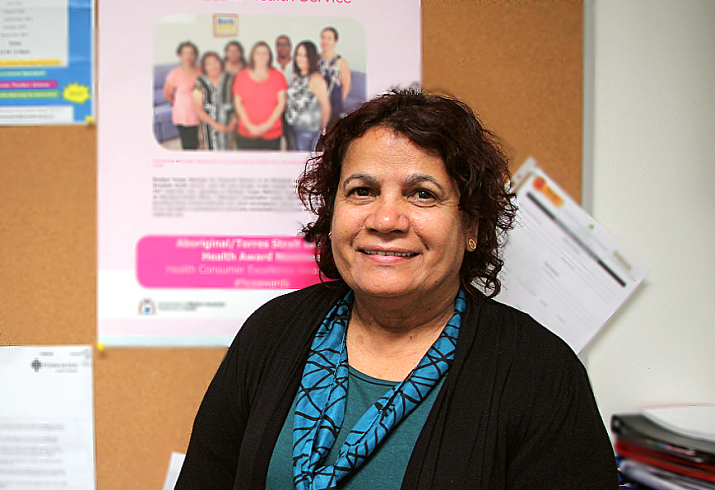Christine Parry’s story

Christine is an Aboriginal Health Officer working with Armadale Health Service’s Boodjari Yorgas Midwifery Group Practice program, supporting local women having Aboriginal babies through their pregnancy, labour and postnatal care.
Here is Christine’s story, in her own words:
“I was born in Pingelly, a small town south of Perth located in the Wheatbelt region of Western Australia, and when I was young we moved up to Armadale because our parents wanted better education for us and for us to be involved with sport. I am the second eldest in our family but the eldest girl; I have 3 sisters and 4 brothers. My dad worked in the local brickworks, while my mum was a housewife, staying home to look after the younger kids. My brothers played football over the years for Armadale and so did my dad, and my sisters played netball or basketball while I mainly played hockey.
My family’s tongue is Noongar, but my parents were unable to learn it from their parents or grandparents because they were not allowed to speak their language, so we didn’t speak it growing up or get to learn it, and that is sad because I would love to learn to speak Noongar. I have a lot of family spread out all over the South West, with relatives from my dad and mum’s side living in and around Busselton, Bunbury, Collie, Pingelly, Narrogin and other areas of WA. My family name was Hill, and my mother’s maiden name was Thorne and both these families were big.
I was raised in a strong family, and we all worked hard to support each other. We were proud of our culture, and of ourselves and how we lived our lives, and that’s something we pass on to the next generations. I wouldn’t be where I am now without the support I received from my parents, my dad was a role model to the local Aboriginal and non-Aboriginal families in Armadale through his love of sport, especially football.
When I was young I worked in a local deli in Armadale, and after high school I decided that I wanted work with children. I started with a course in childcare, and graduated as a qualified child care worker and became an Assistant Teacher at a local Pre-Primary in Armadale. I then furthered my studies, completing a degree in Adelaide to become an early childhood teacher. On my return from Adelaide I worked in several different schools until I started working at Gwynne Park Primary School as an Early Childhood Teacher in an Aboriginal Pre-School where I stayed for a number of years before moving to Broome.
In 2011, I returned to Armadale to work at the Boodjari Yorgas Family Care Program, as it was known then, until it came under the Midwifery Group Practice in 2016. I have been with Boodjari Yorgas Midwifery Group Practice for 8 years now and am very passionate about what I do. Moving to the field of health from education was a change, and I hope that I can make a difference in what I do.
I love what I do at the Boodjari Yorgas program. I get the opportunity to meet a lot of new people, and I have connections with the local families. Many of the women and their partners that come through the program are old students of mine or they are related to me and it’s rewarding to be able to continue to support them in different stages of their lives.
At Boodjari Yorgas we support the local women through their pregnancies, as well as following up with postnatal care. I also work with the midwives to provide cultural awareness training, and assist with their home visits. It’s a chance to close the gap in healthcare, and help the women understand the importance of attending their appointments. As health practitioners, it’s our responsibility to share information and help educate, but it’s also to listen, and be there when someone needs to talk. My ultimate wish is that someday we have an Aboriginal midwife working within Boodjari Yorgas and that we continue to grow as an Aboriginal maternity program and provide the support that is needed by our community and women having Aboriginal babies.
Having travelled and worked in different areas of Australia as a Noongar woman, I’ve had the opportunity to see a lot of different cultural perspectives on healthcare and education. At the end of the day, though, we all want the same thing. We want to make positive changes in our communities, for better health and education outcomes, particularly for children but also to support the elders and vulnerable Aboriginal people to ensure they are living the best life possible.”

